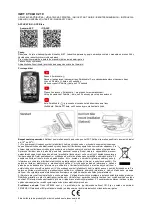
Order No. 2104 ..
Accept setpoints permanently
If the basic setpoint has been modified by the communication objects "Basic setpoint" or
"Setpoint of active operating mode", two possible cases can be distinguished, which are set by
the parameter "Permanently apply change to basic temperature setpoint" (with relative setpoint
presetting) or "Accept modification of the setpoint permanently" (with absolute setpoint
presetting)...
-
Case 1: The setpoint adjustment is permanently accepted ("Yes" setting):
If, with this setting, the temperature setpoint is adjusted, the controller saves the value
permanently to the EEPROM (permanent storage). The newly adjusted value will overwrite
the initial value, i.e. the basic temperature originally configured via the ETS after a reset or
the absolute setpoint temperature loaded using the ETS. The changed values are also
retained after a device reset, after a switchover of the operating mode or after a switchover
of the heating/cooling mode (with absolute setpoint specification individually for each
operating mode for heating and cooling).
With this setting, it should be noted that frequent changing of the basic temperature (e.g.
several times a day because of cyclical telegrams) can affect the product life of the device
as the non-volatile storage is designed for less frequent write access.
The "Basic setpoint" object (relative setpoint presetting) is not bidirectional, meaning that a
shifted basic setpoint is not signalled back to the KNX. The object "Setpoint active
operating mode" (absolute setpoint presetting) can be bidirectional if necessary (set
"Transmit" flag!). This makes it possible to use this object to feedback to the bus the
setpoint temperature resulting from a setpoint shift.
-
Case 2: The basic setpoint adjustment is only temporarily accepted ("No" setting):
The setpoints received via the objects remain active only temporarily. In case of a bus
voltage failure, after a switchover to another operating mode (e.g. Comfort to Standby, or
also Comfort to Comfort), or after a switchover of the heating/cooling mode (e.g. Heating to
Cooling), the last setpoint changed will be discarded and replaced by the initial value.
i
If the setpoint is accepted on a non-temporary basis ("Yes" setting), the setpoints restored
after a device reset are not effected immediately in the communication objects. Only after
the telegrams have been received from the bus via the objects and the room temperature
controller accepts the newly received setpoint can the objects be read out, for example for
visualisation purposes (Set "Read" flag!).
i
With relative setpoint presetting: Independent of the "Permanently apply change to basic
temperature setpoint" parameter, the temperature setpoints for the standby or night mode
or "cooling" comfort mode (deadband) will always be stored in the non-volatile EEPROM
memory.
With absolute setpoint presetting: As described, dependent on the "Accept modification of
the setpoint permanently" parameter, the temperature setpoints for the standby or night
mode for heating or cooling will always be stored in the volatile or non-volatile memory.
Basic setpoint shift for relative setpoint presetting
In addition to presetting individual temperature setpoints by the ETS or basic setpoint object,
the user, when presetting relative setpoints, can shift the basic setpoint in predefined limits
within a specific range. When doing so, the basic setpoint is adjusted up or down in levels. The
value of a level can be adjusted to 0.1 K or 0.5 K by the parameter "Value of the setpoint shift".
i
No basic setpoint shift can be performed if the controller is configured for absolute setpoint
presetting.
Page 96 of 171
Software "KNX CO2 sensor"
Functional description
















































